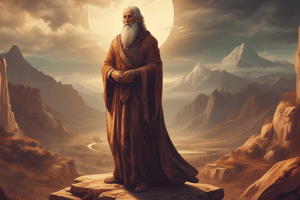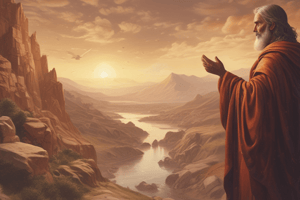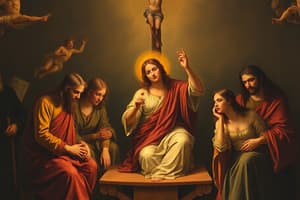Podcast
Questions and Answers
What was the main focus of the intellectual movement of Humanism during the Renaissance?
What was the main focus of the intellectual movement of Humanism during the Renaissance?
- Scientific experiments and observations
- Education and the classics (correct)
- Theological debates and reforms
- Artistic innovations and creativity
Who is credited with the invention of a printing press with moveable type?
Who is credited with the invention of a printing press with moveable type?
- Sir Thomas More
- Leonardo da Vinci
- Johannes Gutenberg (correct)
- Martin Luther
What did Copernicus conclude about the universe?
What did Copernicus conclude about the universe?
- The Sun is the center of the universe (correct)
- The Moon is the center of the universe
- The Earth is the center of the universe
- The universe is infinite and has no center
What was the title of the book written by Sir Thomas More?
What was the title of the book written by Sir Thomas More?
What was the name of the first Protestant sect that emerged from the Reformation?
What was the name of the first Protestant sect that emerged from the Reformation?
What was the term used to describe the everyday language of ordinary people during the Renaissance?
What was the term used to describe the everyday language of ordinary people during the Renaissance?
What was the title given to Sir Thomas More in 1521?
What was the title given to Sir Thomas More in 1521?
What was the name of the English king who was a contemporary of the Renaissance figures?
What was the name of the English king who was a contemporary of the Renaissance figures?
What was the outcome of Augustine's vision?
What was the outcome of Augustine's vision?
What was the primary purpose of the 'Bread and Circuses' movement?
What was the primary purpose of the 'Bread and Circuses' movement?
What was the duration of the Pax Romana period?
What was the duration of the Pax Romana period?
What was the hierarchy of the Early Church?
What was the hierarchy of the Early Church?
What was the significance of Justinian's Code?
What was the significance of Justinian's Code?
What was the purpose of a charter in the Middle Ages?
What was the purpose of a charter in the Middle Ages?
What was the significance of the Magna Carta?
What was the significance of the Magna Carta?
What was the primary purpose of Justinian's Code?
What was the primary purpose of Justinian's Code?
What was the primary goal of Charlemagne's military campaigns?
What was the primary goal of Charlemagne's military campaigns?
What was the principle of Habeas Corpus?
What was the principle of Habeas Corpus?
Who were the Franks?
Who were the Franks?
What was the outcome of the Great Schism?
What was the outcome of the Great Schism?
What was the role of popes in the Middle Ages?
What was the role of popes in the Middle Ages?
What was the impact of the 100 Years War on society?
What was the impact of the 100 Years War on society?
Who was Shakespeare?
Who was Shakespeare?
What was the practice of usury?
What was the practice of usury?
Who developed the basics for calculus?
Who developed the basics for calculus?
What is the main idea behind the Heliocentric universe?
What is the main idea behind the Heliocentric universe?
What was the main contribution of John Locke to political philosophy?
What was the main contribution of John Locke to political philosophy?
What is the main purpose of the Balance of Power?
What is the main purpose of the Balance of Power?
Who is known for his book 'An Inquiry into the Nature and Causes of the Wealth of Nations'?
Who is known for his book 'An Inquiry into the Nature and Causes of the Wealth of Nations'?
What is the main idea behind the Free Market System?
What is the main idea behind the Free Market System?
Who advocated for the idea that only a powerful government can protect society?
Who advocated for the idea that only a powerful government can protect society?
What was the significance of the English Bill of Rights?
What was the significance of the English Bill of Rights?
What is the primary reason why people enter into a social contract with their government?
What is the primary reason why people enter into a social contract with their government?
Which type of government is characterized by a ruler having complete authority over the government and lives of the people he or she governs?
Which type of government is characterized by a ruler having complete authority over the government and lives of the people he or she governs?
Who is considered the symbol of absolute monarchy?
Who is considered the symbol of absolute monarchy?
What is the idea that a ruler's authority comes directly from God?
What is the idea that a ruler's authority comes directly from God?
What are the fundamental rights that belong to all humans from birth?
What are the fundamental rights that belong to all humans from birth?
What is the system of government where power is defined and limited by law?
What is the system of government where power is defined and limited by law?
What was the impact of the English Bill of Rights on Parliament?
What was the impact of the English Bill of Rights on Parliament?
What are the characteristics of England's constitutional government?
What are the characteristics of England's constitutional government?
Flashcards are hidden until you start studying
Study Notes
Christian Scholar - Augustine
- Studied in Roman Africa and became a bishop
- Converted to Christianity after having a vision
- Became a missionary to spread the teachings of Jesus
Pax Romana
- Means Roman peace
- A 200-year period of peace and economic prosperity
- Characterized by a time of peaceful and prosperous conditions
Early Church Hierarchy
- Pope/Patriarch → Bishop → Diocese → Priest → Community
- The hierarchy of the early Christian Church
Medieval Christian Europe
- Justinian - Byzantine Emperor who created Justinian's Code, a collection of Roman laws
- Charter - a written document that set out the rights and privileges of a town
- Common Law - a legal system based on custom and court rulings
- Autocrat - a ruler with complete authority
- Magna Carta - a document that limited royal power and established certain rights of English freemen
- Feudalism - a loosely organized system of government in which local lords governed their own lands but owed military service and other support to a greater lord
- Charlemagne - King of the Franks, the Lombards, and emperor of the Romans who conducted military campaigns, spread Christianity, and supported cultural renewal
- Feudal Contract - an exchange of pledges between lords and vassals
- Secular - having to do with worldly, rather than religious, matters
- Due Process of Law - the requirement that the government act fairly and in accordance with established rules
- Anti-semitism - discrimination against or dislike of Jews
- Habeas Corpus - the principle that a person cannot be held in prison without first being charged with a specific crime
- Usury - the practice of lending money at interest
- Vikings - Scandinavian peoples who raided Europe from the 700s through the 1100s
Justinian's Code
- A collection of Roman laws created by Justinian
- Served as a model for the Church and Medieval Monarchs
- Allowed women to own property, make contracts, and bring lawsuits
The Franks
- A Germanic tribe that conquered present-day France and neighboring lands in the 400s
Life of Serfs
- Serfs were peasants bound to the lord's land
- They had hard lives and were restricted in their movements and activities
Role of Popes in the Middle Ages
- The pope was the spiritual leader of Roman Catholic Christians
- Also ruled vast lands in central Italy, later called the Papal States
Popes vs Monarchs
- Monarchs were absolute rulers who were kings or queens
- Popes led the Church, which sometimes led countries
Pope Innocent III
- Became pope and extended the authority of the papacy over Rome and in Italy
The Great Schism
- Two sections of the Church were formed: the Roman Catholic and the Byzantine
Effects of the 100 Years War
- Destroyed the feudal nobility and brought about a new social order
The Renaissance
Shakespeare
- A famous poet and playwright during the reign of Queen Elizabeth I
- Wrote 37 plays that are still performed around the world
- Invented words and phrases still used today
Humanism
- An intellectual movement that focused on education and the classics
- Took a humanist approach to characters
Johannes Gutenberg
- A goldsmith, printer, and publisher who invented the printing press with moveable type
- Printed the first complete edition of the Christian Bible around 1455
Scientific Method
- A careful, step-by-step process used to confirm findings and prove or disprove a hypothesis
Leonardo da Vinci
- An Italian artist considered the ideal Renaissance man due to his varied talents
Indulgence
- A pardon for sins committed during a person's lifetime in the Roman Catholic Church
Sir Thomas More
- Wrote Utopia, describing an ideal society
- The word utopian came to mean idealistic or visionary
Theocracy
- A government run by religious leaders
Copernicus
- A Polish astronomer who concluded that the sun is the center of the universe
- Contradicted the religious and scientific belief that Earth was the center of the universe
Vernacular
- The everyday language of the normal people
Martin Luther
- A German monk and theologian who was the catalyst of the Protestant Reformation
- Challenged Church teachings with his 95 Theses
- Led to the development of Lutheranism, the first of several Protestant sects
Henry VIII
- The second Tudor king of England
- Started a policy of religious compromise
Isaac Newton
- A scientist who discovered gravity and developed the basics for calculus
- Described a heliocentric universe
Absolutism and the Enlightenment
John Locke
- A prolific writer on political philosophy who influenced the U.S. Constitution and the development of American government
- Proposed that people are born with certain natural rights that cannot be taken away, including life, liberty, and property
Balance of Power
- A distribution of military and economic power that prevents any one nation from becoming too strong
Peter the Great
- Proclaimed emperor in 1721
- One of Russia's greatest statesmen, organizers, and reformers
English Bill of Rights
- A series of acts passed in 1689 by the English Parliament that limited the rights of the monarchy and ensured the superiority of Parliament
Adam Smith
- A Scottish economist who argued for free markets with minimal government interference
- Helped shape productive economies around the world for more than 200 years
Thomas Hobbes
- An influential English political philosopher who advocated for a powerful government to protect society
- Believed that people entered into a social contract with their government to avoid chaos and lawlessness
Absolute Monarchy
- A form of government in which a ruler has complete authority over the government and lives of the people they govern
Louis the XIV
- Served as king of France and is considered the symbol of absolute monarchy
Limited Government
- The government only has those powers delegated to it by law
Catherine the Great
- German-born empress of Russia who led her country in becoming part of the political and cultural life of Europe
Divine Right
- The idea that a ruler's authority came directly from God
Natural Rights
- Rights that belong to all humans from birth, such as life, liberty, and property
Constitutional Government
- A government whose power is defined and limited by law
Social Contract
- An agreement by which people gave up their freedom to a powerful government in order to avoid chaos
Phillip II
- Supported and provided financial support for the arts
Henry IV
- Helped reunite France by renouncing Protestantism and converting to Roman Catholicism
Oliver Cromwell
- An English soldier and gentleman who led the forces against Charles I of England during the English Civil War
- Made himself Lord Protector of England in 1653, leading the country as a republic until his death
English Bill of Rights' Impact on Parliament
- Firmed established the principles of frequent parliaments, free elections, and freedom of speech within Parliament
Characteristics of England's Constitutional Government
- The rule of law, the separation of government into executive, legislative, and judicial branches, the accountability of ministers to Parliament, and the independence of the judiciary
Studying That Suits You
Use AI to generate personalized quizzes and flashcards to suit your learning preferences.




